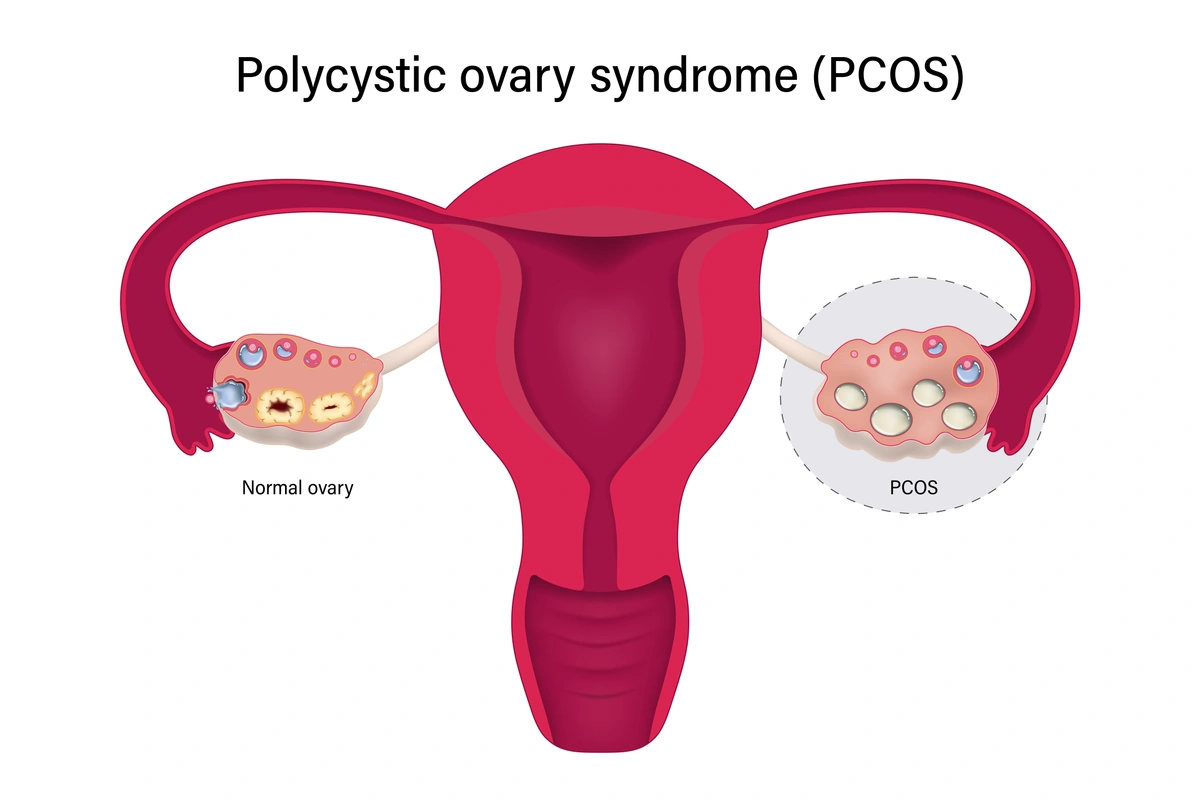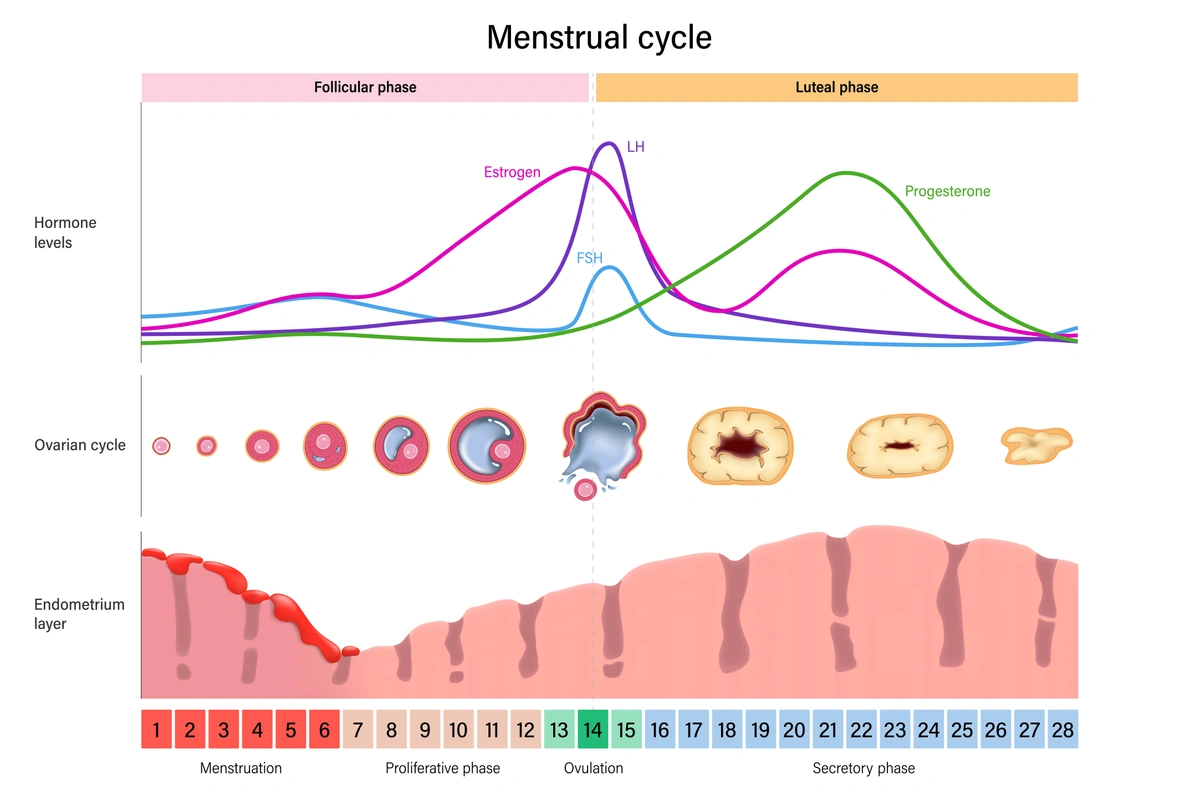
Polycystic Ovarian Syndrome (PCOS) and Reproduction: What You Need to Know About Fertility & Pregnancy
PCOS is one of the most common—but still misunderstood—causes of infertility. Affecting up to 1 in 10 women of reproductive age, PCOS is a hormonal condition that can interfere with ovulation and make it more difficult to conceive. But here’s the good news: many people with PCOS go on to have successful pregnancies, with or without fertility treatments.
Whether you’ve just received a PCOS diagnosis or have been managing symptoms for years, understanding how this condition affects fertility can help you feel more empowered and informed about your options.
Illustration of a “normal” ovary and one with PCOS
How PCOS Affects Ovulation and Fertility
At the core of PCOS is a hormonal imbalance that disrupts normal ovulation. In a typical cycle, a mature egg is released from the ovary during ovulation, providing the opportunity for pregnancy. However, PCOS can interfere with this process in several ways:
-
Irregular or absent periods: Many people with PCOS experience infrequent or unpredictable menstrual cycles, which means they may ovulate less often or not at all.
-
Excess androgens: PCOS is associated with elevated levels of androgens (sometimes called “male” hormones), which can prevent the development and release of eggs.
-
Insulin resistance: Many patients with PCOS also have insulin resistance, which can worsen hormonal imbalances and increase the risk of diabetes.
These disruptions make it harder to predict ovulation or time intercourse for conception, which is why many people with PCOS seek fertility support.
Illustration of a menstrual cycle
Does PCOS Cause Infertility?
PCOS is one of the leading causes of ovulatory infertility—but that doesn’t mean a PCOS diagnosis equals infertility. Many people with PCOS conceive naturally, especially if they have mild symptoms or manage the condition with lifestyle changes.
In other cases, fertility treatment can significantly increase the chances of getting pregnant. The key takeaway: PCOS can make getting pregnant more challenging, but it doesn’t make it impossible.
Fertility Treatment Options for PCOS
If you’ve been trying to conceive without success and have PCOS, there are several treatment paths your fertility specialist may recommend:
1. Lifestyle Changes
Weight loss—even a modest 5-10%—can help regulate cycles and improve ovulation. Diet, exercise, and stress management are often the first steps, especially if insulin resistance is a factor.
2. Ovulation Induction
Medications like letrozole or clomiphene citrate can help trigger ovulation in people who aren’t ovulating regularly. These are often used as first-line treatments.
3. Insulin-Sensitizing Medications
Metformin, commonly used for diabetes, may help regulate insulin levels and support ovulation in people with PCOS.
4. Intrauterine Insemination (IUI) or In Vitro Fertilization (IVF)
If oral medications aren’t effective, assisted reproductive technologies like IUI or IVF may be recommended—especially if other fertility factors are also present.
Your provider will work closely with you to determine the right approach based on your symptoms, hormone levels, and personal goals.
PCOS and Pregnancy: What to Expect
If you do conceive with PCOS, your provider will likely take some extra steps to ensure a healthy pregnancy. PCOS can increase the risk of certain complications, including:
-
Gestational Diabetes: A type of diabetes that develops during pregnancy and usually goes away after delivery. It can affect your baby’s growth and increase the risk of a larger birth weight or early delivery if not managed properly.
-
Preeclampsia: A pregnancy-related condition that causes high blood pressure and can affect organs like the liver and kidneys. It can be serious if left untreated and often requires close monitoring.
-
Preterm Birth: This refers to when a baby is born before 37 weeks of pregnancy. Babies born early may need extra medical care and can face short- or long-term health challenges.
-
Miscarriages: The loss of a pregnancy before 20 weeks. It usually happens because the embryo or fetus isn’t developing as expected. Miscarriages are common and often occur early in pregnancy, sometimes before a person even knows they’re pregnant.
However, with proactive care and monitoring, most patients with PCOS have healthy pregnancies and deliver healthy babies.
Here are a few tips for managing PCOS symptoms during pregnancy:
-
Continue a balanced, nutrient-rich diet to support blood sugar and hormone stability.
-
Keep active with safe, low-impact movement like walking or prenatal yoga.
-
Follow your provider’s recommendations for managing insulin or blood pressure if needed.
-
Attend all prenatal appointments for ongoing monitoring and early detection of potential concerns.
Final Thoughts: You're Not Alone in This
PCOS can feel overwhelming—especially when it comes to your fertility. But you're not alone, and a diagnosis doesn’t mean the end of your parenthood journey. With expert guidance, personalized care, and the right support, many people with PCOS build the families they’ve dreamed of.
Ready to take the next step?
At Advanced Fertility Center of Chicago, our experienced team specializes in diagnosing and treating PCOS-related infertility. We’re here to answer your questions, explore your options, and help you navigate the path to pregnancy with confidence.
Schedule a consultation today and take control of your fertility journey.
Categories
About the AFCC Blog
Welcome to the Advanced Fertility Center of Chicago’s blog! Here, you will find information on the latest advancements in fertility care and treatments, including IVF, IUI, third-party reproduction, LGBTQ+ family building, preimplantation genetic testing, and more. Since 1997, we’ve used our experience and continuous investment in the latest fertility technology to help thousands of patients grow their families. Contact us today for more information or to schedule a new patient appointment.



